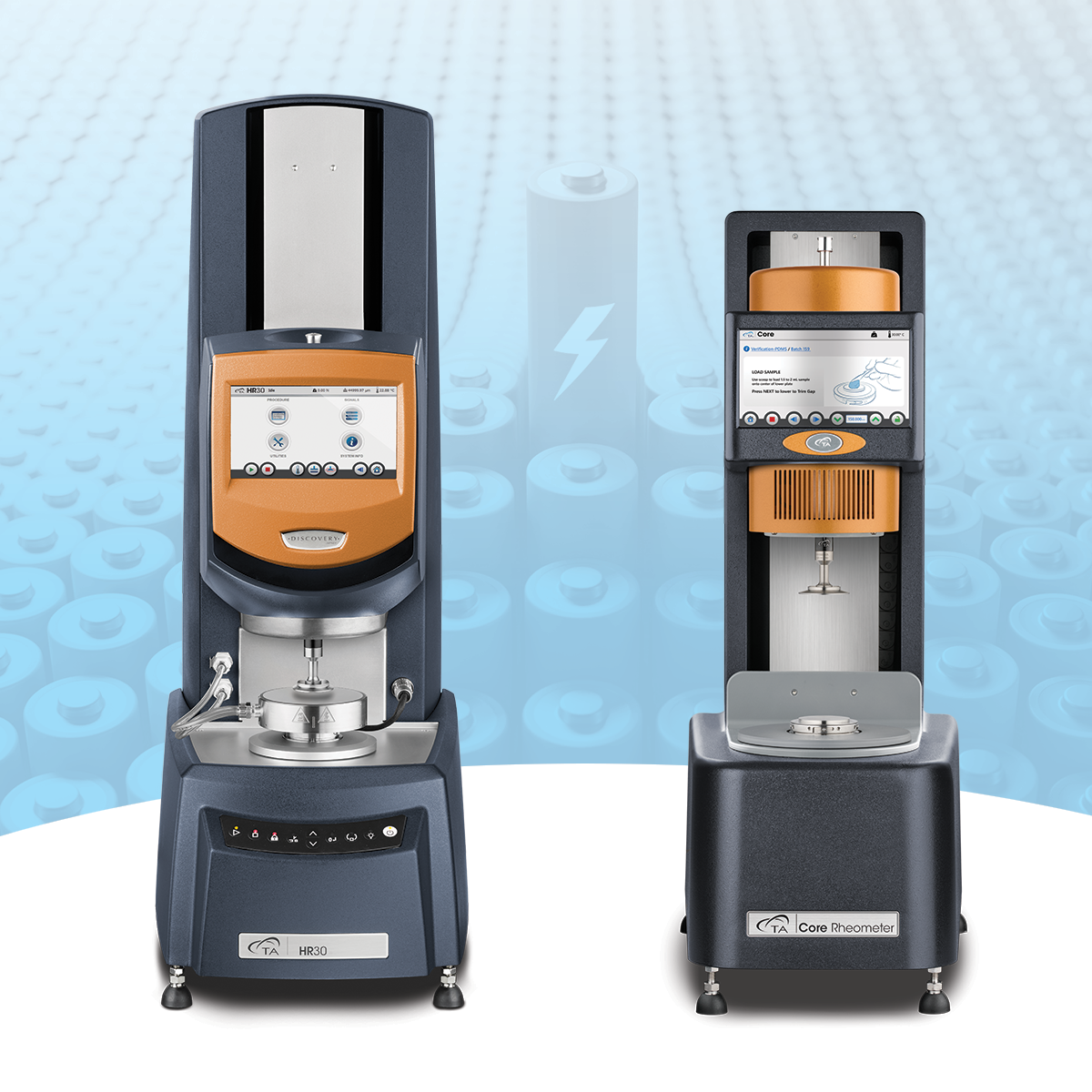Battery Rheology: Selecting the Best Rheometer for Battery Material Testing
Hang Lau | Alina Latshaw
March 31, 2025
In battery development, precise rheological measurements are critical for optimizing material performance, ensuring uniform coatings, and enhancing conductivity. Whether working with cathode, anode, or electrolyte materials, selecting the right rheometer is essential. TA Instruments offers two industry-leading solutions: the Discovery Core Rheometer and the Discovery Hybrid Rheometer. This guide helps battery scientists determine which instrument best suits their needs.

Battery Rheology: Why It Matters
Battery performance hinges on the rheology of its components. Slurry stability, viscosity, yield stress, and viscoelastic properties dictate efficiency in mixing, transport, and electrode coating. Choosing between the Core and Hybrid Rheometer depends on the complexity of your testing requirements.
Rheology of Electrode Slurry Materials: Core vs. Hybrid Rheometer
Electrode slurries require precise viscosity and viscoelasticity measurements to ensure stability, proper transport, and uniform coating.
Discovery Core Rheometer – Best for Routine Electrode Slurry QA/QC Testing
The Core Rheometer is the ideal solution for fundamental viscosity and rheology testing, including:
- Slurry Storage Stability: Measures zero shear viscosity and viscoelasticity to prevent settling.
- Pumpability & Transport: Analyzes yield stress and viscoelasticity for efficient handling.
- Electrode Coating: Optimizes viscosity (shear thinning index), yield stress, and thixotropy for uniform layer application.
- Coating Uniformity Optimization: Assesses viscosity and thixotropic behavior to control thickness.
Discovery Hybrid Rheometer – Best for Advanced Electrode Slurry Testing
For scientists requiring additional insight into electrode behavior, the Hybrid Rheometer offers:
- Electrically Conductive Network Testing: Friction-free Rheo-Impedance Spectroscopy to evaluate the conductive network.
- Powder Characterization: Evaluates mixing and stability of active cathode and anode materials with the Powder Rheology Accessory.
- Inert Environment Operation: Compatible with dry room and glovebox setups for working with sensitive materials.
Rheology of Electrolyte Materials: The Hybrid Rheometer Advantage
Electrolytes exhibit diverse rheological behaviors, from Newtonian flow to shear thinning and thickening. The Discovery Hybrid Rheometer is the best choice for electrolyte research, including liquid, polymer-gel and solid electrolyte, offering:
- Pumpability & Transport: Measures yield stress, viscosity, and viscoelasticity.
- Structural Network: Analyses structural and viscoelastic properties’ impact in ionic conductivity.
- Atmospheric Control: Compatible with dry room and glovebox setups and argon/nitrogen atmospheres.
Key Takeaways: Which Rheometer is Right for You?
- Choose the Discovery Core Rheometer if you need routine rheological QA/QC measurements for viscosity, yield stress, and viscoelasticity.
- Choose the Discovery Hybrid Rheometer if you require advanced analysis, including rheo-impedance, powder characterization, and glovebox compatibility.
FAQ: Battery Rheology & TA Instruments Rheometers
Q: What is the primary difference between the Core and Hybrid Rheometer for battery testing?
A: The Core Rheometer is optimized for fundamental viscosity and yield stress measurements, while the Hybrid Rheometer provides additional capabilities, including rheo-impedance and powder characterization.
Q: Which rheometer should I use for cathode slurry testing?
A: If you need essential viscosity and yield stress measurements, use the Core Rheometer. For advanced electrical network testing and powder analysis, use the Hybrid Rheometer.
Q: Can I test electrolyte materials with the Core Rheometer?
A: No, electrolyte testing requires the Hybrid Rheometer due to its ability to analyze rheo-impedance and perform tests in inert atmospheres.
Q: Which rheometer works best for anode materials?
A: The Core Rheometer is ideal for standard anode slurry testing, while the Hybrid Rheometer is best for advanced characterization, including conductivity analysis and powder rheology.
For battery scientists looking to optimize rheological testing, TA Instruments | Waters provides the most advanced and reliable solutions. Choose the Discovery Core Rheometer for routine viscosity testing or the Discovery Hybrid Rheometer for cutting-edge battery material research.
Other Resources
- Blog – What is Dynamic Mechanical Analysis?
- Blog – What are Rheometry and Rheology?
- Blog – Linear Viscoelastic Region: Why It’s Crucial in Materials Testing
- Application Note – Measurement of Glass Transition Temperatures by Dynamic Mechanical Analysis and Rheology
- Application Note – Temperature and Frequency Trends of the Linear Viscoelastic Region
- Application Note – Introduction to Dynamic Mechanical Analysis and its Application to Testing of Polymer Solids







